“Censorship is to art as lynching is to justice,” Henry Louis Gates Jr., professor of literature at Harvard University, once stated. Several thousand years prior, Euripides opined similarly: “This is slavery, not to speak one’s thought.”
Freedom of expression serves as the cornerstone of higher education, allowing the university to thrive as a marketplace of ideas where competing hypotheses can be evaluated, disputed and adjudicated. Importantly, even when individuals disagree with another’s position, their argument can only be sharpened by carefully engaging dissenting opinions. Yet despite the enduring need for unrestricted speech in academia, Duke University has failed to adopt the Chicago Principles, the leading declaration on free expression drafted by the University of Chicago in 2014. In doing so, our administration has erred dangerously, to our detriment.
Since its inception, academia has greeted the Chicago Principles with immense enthusiasm, now formally adopted by 82 elite universities. The list of signatories includes prominent names such as Princeton University, Vanderbilt, Columbia, Johns Hopkins, Washington University in St. Louis, Georgetown, the University of Wisconsin system, the University of Minnesota and UNC Chapel-Hill.
This past June, the Board of Visitors at my alma mater, the University of Virginia, also affirmed the Chicago Principles. Why did these universities find it necessary to codify free expression as a permanent value within their classrooms? After all, didn’t these institutions already agree with John Milton that truth would prevail “in a free and open encounter”?
The Chicago Principles are less about a university’s theoretical commitment to free expression and more about the students and faculty they protect. The Chicago Statement defends university members from unfair retaliation and disciplinary measures for holding or speaking views that may be deemed heterodox by the majority.
Without any such safeguard, professors and students alike must tread carefully lest they accidently provoke administrators, who, like Pilate, may be more interested in appeasing the crowds than upholding the principle of justice. For this reason, students and faculty remain unsafe from the possibility of sanctions against unpopular speech until our administration formally drafts a robust policy protecting free expression.
“But Duke already has a policy that protects free expression on campus,” some may counter. Not quite. Duke’s Pickets, Protests and Demonstrations policy—Duke’s closest equivalent to the Chicago Principles—only protects speakers from improper interruption during an academic presentation. It says nothing about whether faculty and students at Duke may be subject to unfair university discipline for espousing unconventional views. When juxtaposed with the Chicago Principles, Duke’s policy comes off as anemic and weak.
Others may object, “But the Foundation for Individual Rights in Education (FIRE) has given Duke University a green light rating.” True, but FIRE’s rating does not offer any legal power in holding university administrators accountable. Only an official university policy can lawfully protect university members from succumbing to partisan hitjobs.
If tomorrow Duke were to bring you before an administrative tribunal for professing an unpopular opinion, you would have little official university policy to defend you. It is no exaggeration to say that your freedom of expression is in danger.
In 2001, Duke’s administration shut down Professor Gary Hull’s website after he posted an article calling for firmer response against terrorism. The University backed off only after public, not legal, outcry. All this occurred even with Duke’s hollow affirmation of free speech in the faculty handbook. Agree with Hull’s view or not, the censorship evinced by Duke’s administration is disturbing. Note well, if it happened to Gary Hull, it could happen to you—there is nothing stopping them from trying again.
In fact, last year John Wilson—fellow at the University of California National Center for Free Speech and Civic Engagement—released a damning report. He assigned Duke the grade of “F” for its restrictions on free press. Sure, these rules apply primarily to journalists, but as Wilson notes, “Duke University, as a private corporation, has no legal obligation to endorse freedom of the press…But it also has no legal obligation to protect freedom of speech or academic freedom.”
If Duke truly values academic freedom, the administration must draft and adopt a statement on free expression, of which there is no better than the Chicago Principles. It is risible that the University asks students to pay over $81,000 per year yet refuses to guarantee basic freedom of expression.
Matthew Arakaky is a doctoral candidate in the Graduate Program of Religion at Duke University, where he studies the religion and literature of the Hebrew Bible. He previously studied at the University of Virginia, Princeton Seminary, the University of Chicago and the Johns Hopkins University.
Get The Chronicle straight to your inbox
Sign up for our weekly newsletter. Cancel at any time.

